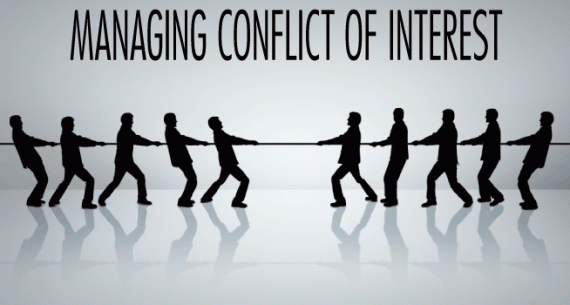Disclosure Doesn’t End Conflicts of Interest
Requiring people with ethical conflicts to disclose them leads to more bad behavior, not less, a new study finds.
Requiring people with ethical conflicts to disclose them leads to more bad behavior, not less, a new study finds.
Boston Globe (“Deeply conflicted: How can we insulate ourselves from conflicts of interest? The most popular solution—disclosing them—turns out not to help“):
Within many fields, one solution has emerged: require people to disclose any ties that might sway their judgment. Such transparency, the rationale goes, encourages those in authority to behave more ethically, and lets those relying on their guidance take the bias into consideration.
But recent research by experimental psychologists is uncovering some uncomfortable truths: Disclosure doesn’t solve problems the way we think it does, and in fact it can actually backfire. Coming clean about conflicts of interest, they find, can promote less ethical behavior by advisers. And though most of us assume we’d cast a skeptical eye on advice from a doctor, stockbroker, or politician with a personal stake in our decision, disclosure about conflicts may actually lead us to make worse choices.
“None of us are saying that transparency is a bad thing,” says Daylian Cain, a behavioral economist at Yale University. “But almost always, it fails to work as well as we think it does.” By assuming that disclosure is always a benefit, he and his colleagues argue, regulators may be failing to address the real problems caused by conflicts of interest. In fact, biases are rooted deep in our psychology, and can’t be dispelled with a simple confession. Policies of disclosure, far from being a panacea, may be drawing attention away from the much harder work of removing conflicts and making sure that people’s advice and their interests align.
[…]
“We call it moral licensing,” Moore says. “After having behaved honestly and virtuously, you then feel licensed to indulge in being a little bit bad.” Other recent findings on ethical behavior, he says, show that people compensate for virtuous acts with vice, and vice versa. “People behave as if they have a moral ‘set point,’?” Moore says. Indeed, it appeared that disclosing a conflict of interest gave people a green light to behave unethically, as if they were absolved from having to consider others’ interests.
What, then, about the other half of disclosure’s supposed benefits? In effect, what the experts were doing was passing the buck on managing their bias to the people they were advising. So does disclosing a conflict of interest enable the people receiving advice to take that information with the proper grain of salt? Research again suggests the answer is no.
[…]
Harvard psychologist Mahzarin Banaji said that the core problem is a fundamental misunderstanding about the pervasiveness and power of bias. We assume we’re in command of our preferences and decisions, but psychology and cognitive science have shown that much of our decision-making occurs unconsciously. Banaji pointed out that we have preferences for everything from politically similar people to the letters in our own names. “There is no ‘neutral’ at the implicit or unconscious level,” she said.
This disconnect results in policies that underestimate not only the prevalence of bias, but also its burden on society. “The big missing ingredient is that people don’t understand how dangerous conflicts of interest are in the first place,” Cain says. He points out that people’s decisions are easily influenced by information they receive beforehand, even if they know the information to be incorrect, irrelevant, or biased. This phenomenon, called anchoring, has been shown time and again in psychological experiments. Thus, experts can’t simply overlook their own personal interests, and those who get advice can’t easily discount experts’ prejudices, even if they want to.
This doesn’t, of course, mean that disclosure is a bad idea. It’s just not enough.
In some cases, we could presumably legislate away the conflict. Physicians shouldn’t be getting kickbacks from drug companies for prescribing their drugs and financial counselors shouldn’t get commissions directly from funds that they market. In both cases, the compensation should come solely from the client, for whom they act as an agent.
But many conflicts are inherent. Stockbrokers who get paid on a commission basis have a strong incentive to churn rather than make sound, longer term decisions. Real estate agents have a powerful incentive to advise sellers to list their homes at a price that will move quickly rather than one that will maximize yields. In both cases, they “disclose” the manner in which they’re being paid but still give the impression that they’re working solely in their clients’ interests.
via The Browser







Of course, in the legal profession we deal with this by saying that some conflicts of interest are so egregious that you could lose your license to practice if you violate them.
Where it gets hard is when lawyers move from one firm to another, which happens a lot more now than it did when the rules were first drafted.
According to the ABA about 800 lawyers are disbarred annually, about .07% of all attorneys. Does anybody really believe that constitutes the total number that should be disbarred?
Self-policing doesn’t work. Not for lawyers. Not for physicians. The system of values that underpins self-policing for professionals doesn’t exist any more.
Dave,
Well, I guess the question is whether every breach of an ethical rule necessarily means that an attorney must be disbarred. Virginia has a range of sanctions that can be imposed ranging from private reprimands that don’t become public record all the way up for lifetime disbarment. Some offenses (such as stealing client funds and fraud on a court) are considered serious enough to merit disbarment even if it was a first offense. Others aren’t.
That’s a depressing conclusion.